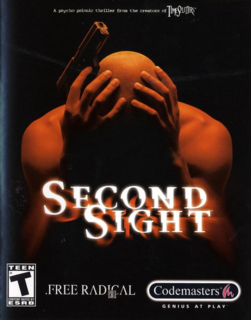Second Sight draws the player in with its amazing story.
The story in Second Sight is one of its strong points, and it's quite interesting to see how these events unfold. Vattic's past is told through flashbacks, so you gradually begin to realize what happened. The story wraps up into a shocking conclusion that I guarantee you won't see coming. The entire story, not just the ending, has many plot twists. At times, the change between these flashbacks is often disturbing. The present Vattic is badly beaten while the past John is entirely normal. Second Sight's story does a great job of drawing you in; you'll find yourself wanting to sit down and just play the entire game so you'll never be left wondering what will happen next.
Second Sight gives you a choice most of the time: you can either pump a few rounds into every enemy in sight (pardon the pun) or sneak past them using stealth tactics. This isn't really stealth in the traditional sense since most of it involves using your psychic powers to keep enemies from seeing you and possibly raising the alarm. You'll use your charm ability (which makes you invisible to all but cameras) to move about unseen, your psi attack to kill enemies silently, and your other abilities in a variety of ways. Of course, you could always use these abilities while you run in with guns blazing, too. Gunplay isn't quite as developed or as encouraged as using your psi powers for stealth purposes, but it still works. There is a handful of weapons in the game, most of them either pistols, machine guns, or a shotgun. The game doesn't allow you to freely aim but has you lock on to a target instead and refine your aim from there. This system is functional but it takes some adjusting as it can feel awkward at first. Other than the imbalance of psychic powers and guns, there are a few minor flaws. Changing targets with the lock-on is very strange and hardly intuitive. The stealth elements and gun fights don't feel as polished as they could have and some of the levels can be unclear as to what you need to do next. Some parts of it can be a little silly, too. You can break the glass on a door but can't reach in to unlock it, for example. It also would have been nice if you could do more than one thing at any given time. You can't combine any of your abilities with guns or your other powers. Mowing down an entire room full of enemies while unseen isn't present, which is a shame because this could have opened up a whole new world of gameplay. The beginning of the game starts off a little slow, too, since the tutorial mission is overly long and you don't really get the good psychic powers until later in the game. Enemy artificial intelligence gives up far too easily. If you've hidden for long enough, they'll simply go away and forget what's happened.
Second Sight maintains the look of Free Radical's other game series, TimeSplitters. The art style is a hybrid between realistic and stylized graphics. Semi-realistic character models always maintain that cartoony look. The characters are extremely expressive and a bit exaggerated because of this art style, but the graphics really don't fit the tone of the game. Second Sight is a dark game and the slight cartoonish appearance feels quite odd given the subject matter. The physics engine could also use a little work since objects can either go through walls sometimes or continue moving. There's little to no sense of contact for certain tasks, such as bashing someone into the wall with telekinesis; it looks like you're gently pushing a man with tuberculosis against a wall.
The sound in the game is okay. Music isn't anything to speak of; it's decent for what there is, but nothing spectacular. Story-driven games usually have many cutscenes, and Second Sight is no exception. This means there's a lot of voice work. It's above average for the most part, but is usually equal in quality to your average Saturday morning cartoon. Some of the voice work is below average, such as the guards' screams of agony before they die; they're so unconvincing that the screams can be a source of humor.
There's very little replay value in Second Sight. Outside of the main game, there's a handful of minigames and a stat-tracking system, neither of which are much of an incentive for a second playthrough. It can be completed in about 12 hours, after which it starts collecting dust on your shelf. In the end, Second Sight has a fantastic story and some interesting ideas. It's short on replay value and not quite as polished as it could have been, but it's still a decent game all around. Anyone looking for an engaging video game should give Second Sight a try.

